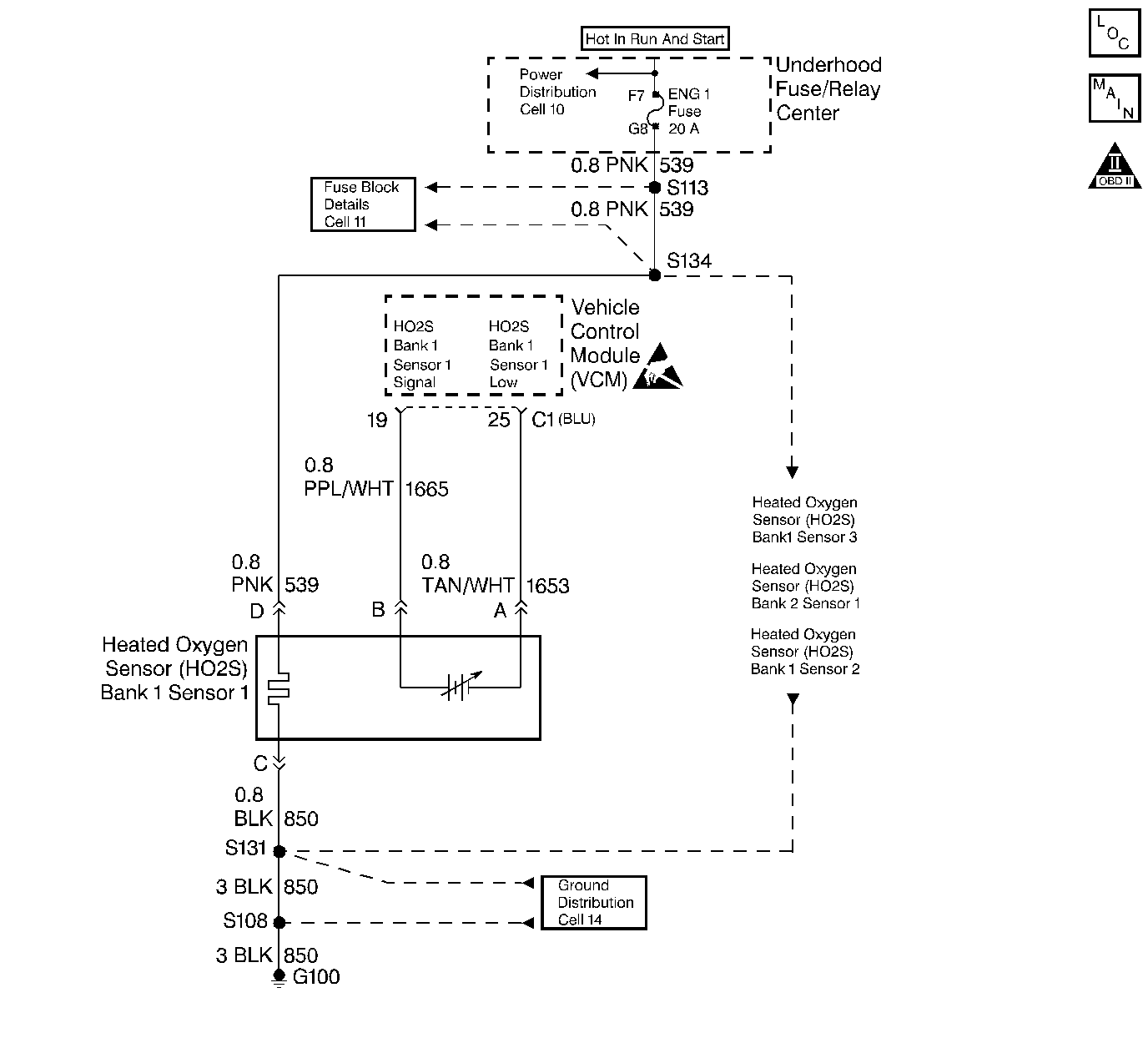
Circuit Description
Important: If the voltage is measured with a 10 Megaohm Digital Voltmeter, the voltage may read as low as 0.32 volt (320 mV).
The VCM supplies a voltage of about 0.45 volt between the HO2S High and the HO2S Low circuits. The Heated Oxygen Sensor (HO2S) varies the voltage from approximately 1.0 volt (1000 mV) during rich conditions to 0.10 volt (100 mV) during lean conditions.
The sensor acts like an open circuit and produces no voltage at temperatures below 360°C (600°F). An open oxygen sensor circuit or a cold oxygen sensor causes an Open Loop operation.
The HO2S heater provides for a faster sensor warm-up. This allows the sensor to become active in a shorter period of time and remain active during a long extended idle.
The DTC P1133 determines if the HO2S is functioning properly by the monitoring the number of the Lean to Rich and the Rich to Lean transition. The DTC P1133 is a type B DTC.
Conditions for Setting the DTC
The following conditions sets the DTC:
| • | No fuel trim DTCs |
| • | L/R switches less than 30. |
| • | R/L switches less than 30. |
| • | No TP sensor DTCs |
| • | No EVAP DTCs |
| • | No IAT sensor DTCs |
| • | No MAP DTCs |
| • | No EGR DTCs |
| • | No ECT sensor DTCs |
| • | The DTC P0135 not set |
| • | Closed Loop |
| • | HO2S voltage between 0.300 volts and 0.600 volts |
| • | Throttle position is greater than 10% but less than 20%. |
Action Taken When DTC Sets
The VCM turns the MIL ON after the second test failure.
Conditions for Clearing the MIL/DTC
The VCM turns OFF the MIL after 3 consecutive driving trips without a fault condition present. A history DTC will clear if no fault conditions have been detected for 40 warm-up cycles (the coolant temperature has risen 22°C (40°F) from the start-up coolant temperature and the engine coolant temperature exceeds 71°C (160°F) during that same ignition cycle) or the scan tool clearing feature has been used.
Diagnostic Aids
Important: Never solder the HO2S wires. For proper wire and connector repairs, refer to Wiring Repairs.
Check for the following conditions:
| • | An improperly installed air intake duct |
| • | The air intake duct for collapsed ducting, restrictions, or a missing or plugged air filter |
| • | Throttle body and intake manifold vacuum leaks |
| • | A damaged or blocked throttle body inlet |
| • | Exhaust system for corrosion, leaks, or loose or missing hardware |
| • | The HO2S is installed securely and the pigtail harness is not contacting the exhaust manifold or wires |
| • | HO2S contamination |
| • | The vacuum hoses for splits, kinks, and proper connections |
| • | Excessive water, alcohol, or other contaminants in the fuel |
| • | VCM sensor grounds that are clean, tight, and properly positioned |
Test Description
The numbers below refer to the step numbers in the diagnostic table.
-
This step checks for other DTCs.
-
This step checks for any physical damage to the engine components and the converter.
-
This step checks the fuel injector and isolates the HO2S.
Step | Action | Value(s) | Yes | No | ||||||||||||||||||||||
|---|---|---|---|---|---|---|---|---|---|---|---|---|---|---|---|---|---|---|---|---|---|---|---|---|---|---|
1 |
Important: Before clearing the DTCs, use the scan tool in order to record the Freeze Frame and the Failure Records for reference. Using the Clear Info function will clear this data. Was the Powertrain On-Board Diagnostic (OBD) System Check performed? | -- | Go to A Powertrain On Board Diagnostic (OBD) System Check | |||||||||||||||||||||||
Are any other DTCs set? | Go to The Applicable DTC Table | |||||||||||||||||||||||||
3 |
Is the MAP sensor voltage greater then the specified value? | 4.0 V | Go to DTC P0108 Manifold Absolute Pressure (MAP) Sensor Circuit High Voltage | |||||||||||||||||||||||
Visually and Physically check for the following conditions:
Was a problem found? | -- | |||||||||||||||||||||||||
5 | Repair as necessary. Replace as necessary. Is the action complete? | -- | -- | |||||||||||||||||||||||
Perform Injector Coil test procedure. Refer to Fuel Injector Coil Test . Was a problem found? | -- | |||||||||||||||||||||||||
7 |
Is a contamination evident? | -- | Go to Diagnostic Aids | |||||||||||||||||||||||
8 | Replace the contaminated HO2S (Bank 1, Sensor 1). Refer to Heated Oxygen Sensor (HO2S) Replacement . Is the action complete? | -- | -- | |||||||||||||||||||||||
9 | Replace the fuel injector. Refer to Fuel Injector Replacement (Central SFI) . Is the action complete? | -- | -- | |||||||||||||||||||||||
10 |
Does the scan tool indicate that this diagnostic ran and passed? | -- | ||||||||||||||||||||||||
11 | Using the scan tool, select the Capture Info and the Review Info. Are any additional DTCs displayed that have not been diagnosed? | -- | Go to The Applicable DTC Table | System OK. |
